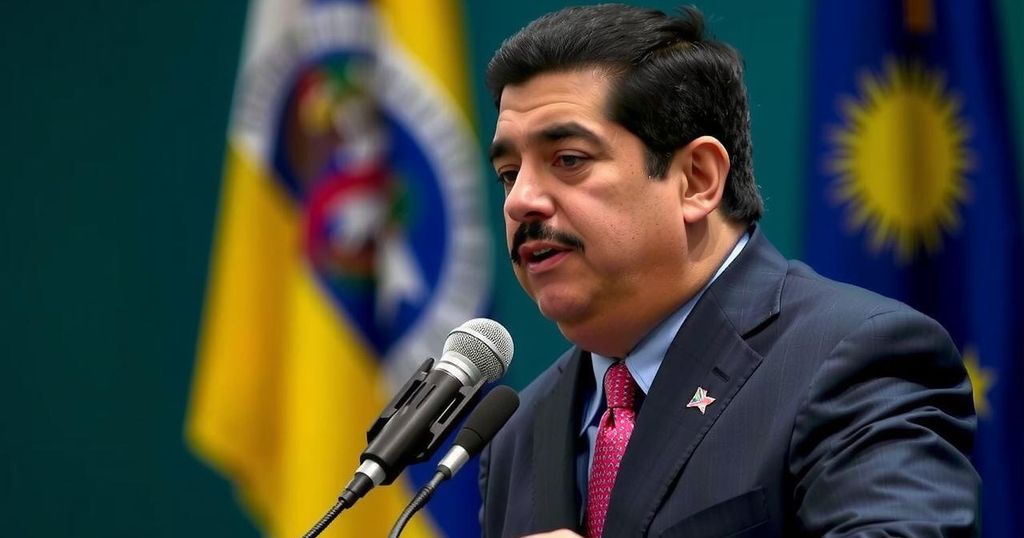Maduro Asserts Venezuela’s Voice Following BRICS Membership Veto by Brazil
Venezuela’s President Nicolas Maduro vowed that the country will not be silenced following Brazil’s veto of its BRICS membership application. Despite the economic crisis fueled by US sanctions, Maduro remains defiant after meeting with leaders from 30 nations. The strained relations with Brazil stem from ongoing political disputes related to his contested re-election.
On October 26, 2024, President Nicolas Maduro of Venezuela asserted that his nation would not be marginalized after Brazil vetoed its application to become a member of the BRICS coalition of emerging economies. Venezuela is currently grappling with a severe economic crisis, which the government attributes to sanctions imposed by the United States, and has long aspired to join the BRICS coalition. Following the veto during a summit held in Kazan, Russia, Venezuela reacted vehemently, denouncing Brazil’s decision as “hostile” and “immoral.” Upon his return, Mr. Maduro declared on state television that “no one will block or silence Venezuela, not today, not tomorrow, not ever,” without directly addressing Brazil’s action. Although Brazilian President Luiz Inacio Lula da Silva has been a historic ally of Mr. Maduro, their relationship has been strained in light of the latter’s contentious re-election, which occurred on July 28. The opposition in Venezuela claims victory in this election, which resulted in tensions surrounding the publication of its detailed results. A former Foreign Minister and advisor to President Lula, Celso Amorim, indicated that the veto stemmed from a loss of trust due to Mr. Maduro’s failure to release these results, further complicating diplomatic relations between the two nations. Following discussions with representatives from nearly 30 countries in Kazan, Mr. Maduro stated that all had recognized his “great electoral victory.” The BRICS group, which consists of Brazil, Russia, India, South Africa, and China, welcomed additional members, including Ethiopia, Iran, Egypt, and the United Arab Emirates, in 2024.
The BRICS alliance — consisting of emerging economies like Brazil, Russia, India, South Africa, and China — has historically aimed to create a counterbalance to Western economic influence. Venezuela, under President Maduro, has sought membership as the country faces dire economic challenges, which its government cites as a consequence of US sanctions. The recent veto by Brazil signifies a potential shift in diplomatic relations amid Venezuela’s internal political disputes, particularly after the controversial presidential election that has led to allegations of electoral fraud and the suppression of opposition voices. This context heightens the importance of international alliances as Venezuela continues to navigate its ongoing crisis.
In summary, President Maduro’s firm stance against Brazil’s veto underscores Venezuela’s determination to assert its place on the international stage despite significant internal and external pressures. The complexities of Venezuelan politics and its economic challenges illuminate the intricate relationship between domestic governance and international alliances, particularly within the BRICS framework. As relations between Maduro’s administration and key global players continue to fluctuate, the resolution of Venezuela’s political legitimacy will remain crucial to its aspirations for wider international recognition.
Original Source: www.thehindu.com




Post Comment